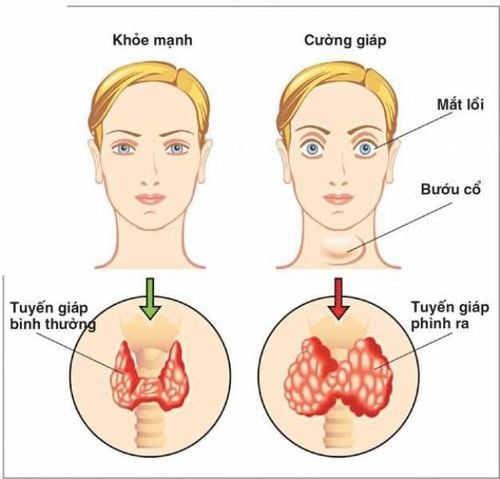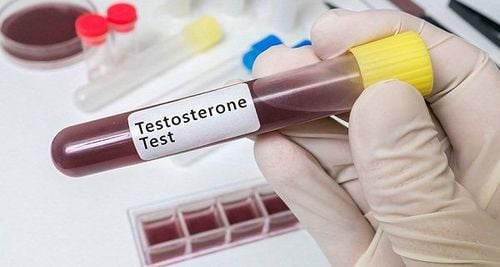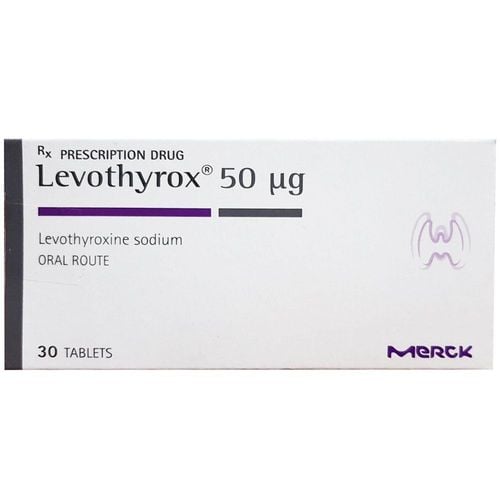This is an automatically translated article.
The article was professionally consulted with Associate Professor, Doctor, Doctor Hoang Dang Mich - Head of Department of Medical Examination & Internal Medicine - Department of Medical Examination and Internal Medicine - Vinmec Ha Long International Hospital.Hyperthyroidism affects the mother's ability to conceive and the pregnancy process. Therefore, learning about the disease is very important to help you deal with the symptoms of the disease appropriately.
1. What is hyperthyroidism?
Hyperthyroidism is a condition in which the thyroid gland is overactive, increasing the production of thyroid hormones T3 (liothyronin) and T4 (levothyroxine) into the blood, causing metabolic disorders of the body. There are many causes of hyperthyroidism such as:Extrathyroidal causes: Due to factors such as Antithyroid antibodies, egg pregnancy, anterior pituitary tumor with increased production of TSH (thyroid stimulating hormone) or other causes of hyperthyroidism. other tumors cause increased production of TSH-like substances; Causes in the thyroid gland: A part of the thyroid gland is overactive due to the loss of control of the pituitary gland, thereby increasing the production of thyroid hormone. Hyperthyroidism is more common in women than in men, and is rare in children under 10 years of age. The basic symptoms of the disease include: Stress, irritability, heart palpitations, sweating, hand tremors, anxiety, trouble sleeping, thin, dry skin, brittle hair, weak muscles (especially in arms and thighs), frequent bowel movements, weight loss despite still feeling hungry, vomiting, etc. Women may have irregular menstrual symptoms, may have a decrease in menstrual volume or no menstrual cycle. even. In the elderly, the symptoms are more subtle.

2. Complications of Hyperthyroidism
Acute hyperthyroidism (thyroid storm): More likely to occur in patients with severe or untreated hyperthyroidism. Symptoms include rapid emaciation, profuse sweating, high fever, agitation, sometimes fatigue, very fast heartbeat (180-200 beats/min), arrhythmia, cardiovascular collapse; Cardiac complications: Common in patients with late treatment or inadequate treatment. Common complications are arrhythmia, atrial fibrillation, complete arrhythmia, which can cause complications of cerebral vascular occlusion, causing hemiplegia. In addition, patients with hyperthyroidism may face the risk of total heart failure.Trắc nghiệm: Bạn có hiểu đúng về dấu hiệu mang thai sớm?
Các dấu hiệu mang thai sớm không phải chỉ mỗi trễ kinh mà còn có rất nhiều dấu hiệu khác như xuất huyết âm đạo, ngực căng tức,… Điểm xem bạn biết được bao nhiêu dấu hiệu mang thai sớm thông qua bài trắc nghiệm này nhé!
3. Does hyperthyroidism cause infertility?
The thyroid gland produces hormones that are essential for the growth and development of the body. From there, thyroid diseases can affect the reproductive health of the patient before, during and after pregnancy. Hyperthyroidism causes an excess of thyroid hormone levels in the body, affecting the way the body uses energy, leading to irregular menstrual symptoms in women, increasing the risk of infertility and infertility. According to the survey, about 2.3% of women with fertility problems have hyperthyroidism. The average rate of the disease is about 1.5% of the population.However, with timely and proper treatment of hyperthyroidism, a woman's chance of becoming a mother is still very high. So can you get pregnant with hyperthyroidism? Women of reproductive age after being stabilized treatment of hyperthyroidism, under the supervision of an endocrinologist, can still have normal pregnancy and childbirth.

If you are pregnant, during this period should not use synthetic antithyroid drugs or radioactive iodine treatment to avoid adverse effects on the fetus. If you miss a pregnancy without stable treatment, you can choose the method of surgery to remove the thyroid gland nearly completely according to the prescription of a specialist. The best time for surgery is the first half of pregnancy to avoid miscarriage after surgery. It is necessary to consult a doctor on a case-by-case basis.
When experiencing symptoms such as excessive sweating, difficulty sleeping, shaking hands, weight loss, stress, heart palpitations, etc., patients should go to the Endocrinology Department - Vinmec International General Hospital to are examined. With a system of modern medical equipment, Vinmec's highly specialized and experienced doctors will accurately diagnose the patient's health condition and offer an appropriate treatment plan. Early and proper treatment according to the doctor's regimen will minimize the risk of infertility and infertility due to hyperthyroidism.
Associate Professor. Dr. Hoang Dang Mich has over 42 years of medical practice, has strengths in the specialized fields of Liver - Kidney - Immune pathology... Currently, he is a Specialist Consultant in General Internal Medicine Department of Examination. Medicine & Internal Medicine, Vinmec Ha Long International General Hospital.
Please dial HOTLINE for more information or register for an appointment HERE. Download MyVinmec app to make appointments faster and to manage your bookings easily.













